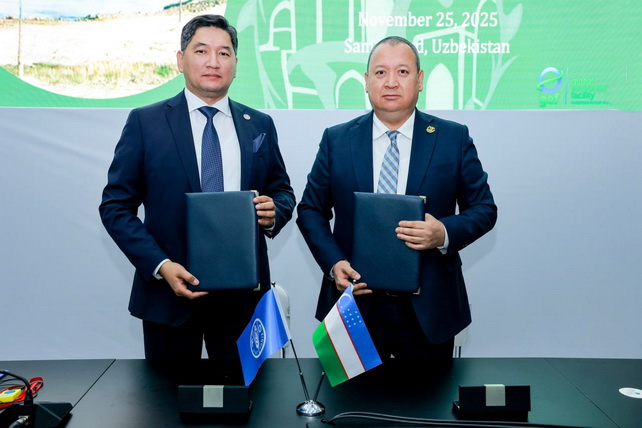
New GEF Initiatives Launched in Central Asia for Sustainable Water and Land Management under COP-20
New GEF Initiatives Launched in Central Asia for Sustainable Water and Land Management under COP-20
Tashkent, Uzbekistan (UzDaily.com) — In response to increasing pressure on water and land resources in Central Asia, rising climate risks, land degradation, and more frequent droughts in the region, a major new environmental initiative has been launched.
The program “Linking Water and Land Resources in Central Asia” (CAWLN), funded by the Global Environment Facility (GEF) and implemented by the Food and Agriculture Organization of the United Nations (FAO) in partnership with the National Committee of the Republic of Uzbekistan on Ecology and Climate Change, was officially presented in Samarkand during the 20th meeting of the Conference of the Parties to CITES (COP-20).
In total, projects worth US$18.4 million will be implemented across Central Asian countries under the program. CAWLN is aimed at addressing systemic environmental challenges relevant to Kazakhstan, Kyrgyzstan, Tajikistan, Turkmenistan, and Uzbekistan. The region, with its unique ecosystems — rivers, wetlands, steppes, deserts, and mountainous landscapes — is facing growing pressure due to climate change, rising resource demand, land degradation, and water scarcity.
During the presentation, the CAWLN concept was outlined, focusing on the implementation of scientifically grounded, coordinated approaches to water and land management, reducing deforestation, enhancing agricultural resilience, preserving biodiversity, and adapting to climate change.
Welcoming remarks were delivered by Deputy Chairman of the National Committee on Ecology and Climate Change, Jusipbek Kazbekov, and FAO Deputy Representative in Uzbekistan, Sherzod Umarov. The presentation concluded with the signing of Uzbekistan’s CAWLN projects, highlighting the country’s and the region’s commitment to sustainable natural resource management. Speakers emphasized the importance of expanding regional dialogue, sharing scientific data, and strengthening interstate coordination to ensure water security and enhance ecosystem resilience in Central Asia.
“CAWLN projects are a natural continuation of FAO’s long-term cooperation with the Government of the Republic of Uzbekistan. The initiative will be implemented in close collaboration with relevant ministries and research institutions. Our common goal is to ensure rational use of water and land resources, restore ecological balance, preserve biodiversity, and create a sustainable foundation for rural livelihoods,” Sherzod Umarov stressed.
Central Asia is a region with unique natural systems and major river basins, including the Amudarya, Syrdarya, Zarafshan, Panj, and Naryn. However, growing resource demand, demographic changes, land degradation, and increasing climate impacts threaten the region’s ecological sustainability. Nearly half of the land is degraded, with total economic losses estimated at US$6 billion annually. Water scarcity adversely affects agriculture, energy, utilities, and natural ecosystems.
The integrated water resource management project in the Amu Darya, Zarafshan, and Panj basins (US$5.84 million) focuses on introducing advanced water management approaches, modernizing monitoring systems, strengthening cross-border cooperation, and ensuring environmentally necessary river flows.
The water management improvement project in the Syr Darya and Naryn basins (US$5 million) includes modernization of water distribution systems, expansion of early warning mechanisms, improved water quality control, and reinforced interstate coordination.
The project supporting ecosystem services and biodiversity through integrated land and water management (US$5.6 million) involves restoring degraded lands, promoting agroecological practices, preserving rare plant species and agrobiodiversity, and supporting rural communities.
The land degradation reduction project in vulnerable Central Asian ecosystems (US$2 million) focuses on restoring desertified areas, introducing sustainable land management practices, expanding monitoring, and enhancing climate resilience of local populations.
Strategic documents adopted at COP-20 reaffirmed the commitment of Central Asian states to strengthen regional environmental cooperation and jointly respond to common challenges. The new GEF projects are expected to enhance water security, reduce land degradation, strengthen ecosystems, promote regional collaboration, and increase resilience to the impacts of climate change.